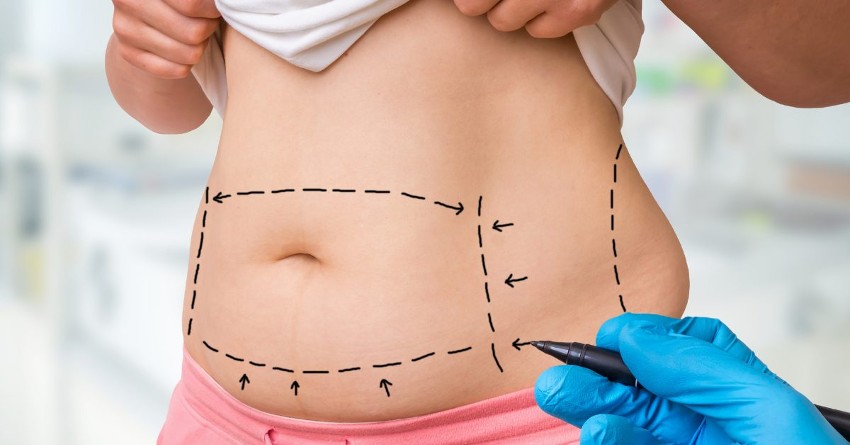-
Fat Removal
There are a number of different fat removal options available, each with its own pros and cons. It’s important to weigh all of your options before deciding on the best course of action for you.
One popular option is liposuction, which can be used to target specific areas of fat. However, it’s important to note that liposuction is a surgical procedure, so there are some risks involved. Additionally, it’s not always effective in removing large amounts of fat.
Another common option is CoolSculpting, which uses cold temperatures to destroy fat cells. This non-surgical procedure is generally safe and has little downtime, but it can be expensive and may not be covered by insurance.
If you’re looking for a more permanent solution, you may want to consider fat removal surgery. This option can be very effective, but it’s also invasive and carries a number of risks.
Fat Removal Surgery
There are several different types of fat removal surgery, each with its own risks and benefits. The three most common types of fat removal surgery are liposuction, tumescent liposuction, and laser-assisted liposuction.
Liposuction is a minimally invasive procedure that can be performed under local or general anesthesia. It involves the use of a small cannula to suction out unwanted fat from the body. Liposuction is often used to target specific areas of the body, such as the thighs, hips, and abdomen.
Another type of fat removal surgery is called tumescent liposuction. This type of liposuction uses a larger cannula and a higher volume of saline solution to help break down and remove more stubborn fat cells. Tumescent liposuction is often used on larger areas of the body, such as the back, arms, and legs.
The third type of fat removal surgery is called laser-assisted liposuction. Laser-assisted liposuction uses a laser to help break down and melt away unwanted fat cells. This type of liposuction is often used on smaller areas of the body, such as the chin, neck, and cheeks.
All types of fat removal surgery come with some risks. These risks include bleeding, infection, bruising, swelling, and numbness. It’s important to talk to your doctor about all of the potential risks before undergoing any type of fat removal surgery.
How should I prepare for fat removal surgery?
Preparing for fat removal surgery will vary depending on the type of procedure you’re having. For example, if you’re having liposuction, you may be asked to discontinue using certain medications, such as blood thinners and non-steroidal anti-inflammatory drugs (NSAIDs), for two weeks prior to the procedure. You will also need to fast for at least six hours before the surgery.
What should I expect during the surgery?
During your fat removal surgery, the area of your body being treated will be numbed with local anesthesia or general anesthesia will be used. Once you’re numb, a small incision will be made and the cannula will be inserted. The surgeon will then move the cannula back and forth to break up and suction out unwanted fat cells.
What should I expect during my fat removal surgery recovery?
After your fat removal surgery, you can expect some bruising, swelling, and soreness. These side effects are usually temporary and will resolve on their own within a few weeks. You may also experience some numbness in the treated area, which should also resolve over time.
What results should I expect after a fat removal surgery?
Results from fat removal surgery are typically visible immediately. However, it may take a few months for your final results to fully develop as your body continues to heal and adjust to the new contours of your figure.
Body contouring surgery is different from fat removal surgery, as it does not suction out fat cells from the body. Instead, body contouring surgery removes excess skin and fat through various techniques, such as liposuction, tummy tucks, and thigh lifts.
Fat removal surgery is a safe and effective way to sculpt your body and improve your self-confidence. There are three main types of fat removal surgery, each with its own benefits and risks. Ultimately, the best fat removal option for you will depend on your individual needs and goals.
Be sure to speak with a qualified healthcare professional to help you make the best decision for your situation. It’s important to talk to your doctor about all of the potential risks before undergoing any type of fat removal surgery.
-
Liposuction Surgery
What is liposuction?
Liposuction is a type of cosmetic surgery that removes fat from the body. The procedure is typically used to improve the appearance of the stomach, thighs, and arms. It is a safe and effective way to remove unwanted fat from the body. The procedure is typically performed as an outpatient procedure, which means you will be able to go home the same day. Recovery times vary, but most people see significant results within a few weeks.
What can liposuction surgery do? Liposuction surgery can create a more sculpted look by removing fat from specific areas of the body. The procedure can also be used to improve the appearance of cellulite.
What liposuction surgery can’t do? Liposuction surgery is not a weight loss solution. The procedure should not be used to remove large amounts of fat from the body. Liposuction is also not an effective treatment for stretch marks or loose skin.
Who is a good candidate for liposuction? Liposuction may be right for you if you are unhappy with the appearance of specific areas of your body, such as the stomach, thighs, or arms. The best candidates for liposuction are at a healthy weight and have realistic expectations for the procedure.
Different types of liposuction surgery
There are several different types of liposuction surgery. The type of procedure that is right for you will depend on your specific goals. Some of the most common types of liposuction surgery include:
Tumescent liposuction: This type of liposuction injects a numbing solution into the area to be treated. The solution helps to reduce bleeding and swelling during the procedure.
Ultrasound-assisted liposuction: This type of liposuction uses ultrasound waves to break up the fat before it is removed from the body.
Laser-assisted liposuction: This type of liposuction uses a laser to break up the fat before it is removed from the body.
What should I expect during a consultation for liposuction surgery?
During your consultation, your plastic surgeon will assess your areas of concern and perform a physical exam. They will also review your medical history to make sure you are healthy enough for surgery. Be sure to ask any questions you have about the procedure during your consultation.
Some important questions to ask your plastic surgeon about liposuction include:
- How many times have you performed this procedure?
- What are your qualifications?
- What are the risks of the procedure?
- What are the potential complications?
- How will you manage any complications?
- What are your fees?
- What are the estimated costs of the procedure, including any potential complications?
- When can I expect to see results?
What are the risks of liposuction surgery?
Liposuction is a safe and effective procedure, but like all surgeries, there are some risks. Potential risks of liposuction surgery include:
- Bleeding
- Infection
- Bruising
- Swelling
- Numbness
- Asymmetry
- Skin irregularities
- Scarring
- Change in skin sensation
- Risks associated with anesthesia
How should I prepare for liposuction?
Your plastic surgeon will provide you with specific instructions on how to prepare for your procedure. In general, you should:
- Stop smoking at least six weeks before surgery to reduce the risk of complications.
- Avoid taking any medications that can thin the blood or cause bleeding.
- Eat a healthy diet and stay well-hydrated to help your body heal after surgery.
What are the steps of liposuction?
Liposuction is typically performed as an outpatient procedure, which means you will be able to go home the same day. The steps of the procedure include:
- Anesthesia: You will be given either local or general anesthesia depending on your preference and the recommendation of your surgeon.
- Incisions: Your surgeon will make small incisions in the treatment area.
- Fat removal: A cannula (a thin, hollow tube) will be inserted through the incisions to remove the fat.
- Closing the incisions: The incisions will be closed with stitches or surgical tape.
What should I expect after liposuction?
You can expect to feel some pain and discomfort after the procedure. Your surgeon will prescribe medication to help you manage any pain. You should also expect some bruising, swelling, and soreness in the treatment area. These side effects should resolve within a few weeks.
Most people see significant results after liposuction surgery. However, it is important to keep in mind that the procedure can only remove a limited amount of fat. You may need to have additional procedures to achieve your desired results.
Is liposuction a form of fat removal surgery?
Yes, liposuction is a type of surgery that removes fat from the body. The fat is removed through small incisions with a cannula (a thin, hollow tube). Liposuction is a more invasive form of surgery than other types of fat removal. It is also more expensive. However, it can be more effective in removing large amounts of fat.
If you are considering liposuction, be sure to consult with a qualified plastic surgeon. They will be able to answer any questions you have about the procedure and help you determine if it is right for you.
-
Tummy Tuck, Abdominoplasty
What is a tummy tuck?
A tummy tuck, also known as abdominoplasty, is a surgical procedure to remove excess skin and fat from the abdomen. It can also tighten the abdominal muscles. Tummy tuck surgery can create a flatter, more toned stomach. It can also help improve the appearance of stretch marks and scars. However, it cannot remove all stretch marks, and it will not eliminate all belly fat.
After abdominoplasty, the outcomes are generally long-term. Maintaining a healthy weight and lifestyle, on the other hand, is critical for preventing future weight gain and regain in the abdominal area.
Types of tummy tuck surgery
There are different types of tummy tuck surgery, depending on the extent of the procedure. A mini tummy tuck focuses on the area below the navel. A full tummy tuck involves an incision from hip to hip and addresses the muscles of the abdomen as well as excess skin and fat.
What should I expect during a consultation for tummy tuck surgery?
During a consultation for tummy tuck surgery, your plastic surgeon will assess your abdominal area and discuss your goals for surgery. They will also ask about your medical history and perform a physical examination.
Be sure to ask your plastic surgeon questions about tummy tuck surgery, including:
- What are their qualifications?
- How many tummy tucks have they performed?
- Where will the surgery be performed?
- What type of anesthesia will be used?
- What are the risks of tummy tuck surgery?
- How long will the surgery take?
- What is the recovery time for tummy tuck surgery?
- What are the possible complications of tummy tuck surgery?
- What results can I expect from tummy tuck surgery?
- How long will the results last?
What are the steps of a tummy tuck surgery & how should I prepare for it?
The steps of a tummy tuck procedure include making an incision in the lower abdomen, removing excess skin and fat, and then suturing the incisions closed. The surgeon may also use drains to help prevent fluid buildup under the skin.
To prepare for a tummy tuck, your plastic surgeon may ask you to stop smoking and avoid taking certain medications, such as ibuprofen, aspirin, and herbal supplements, which can increase the risk of bleeding. You should also eat a healthy diet and get plenty of rest to promote healing after surgery.
What should I expect during my tummy tuck recovery?
After surgery, you will likely experience swelling and bruising in the surgical area. You will also have drains in place to remove excess fluid from the surgical site. These drains are usually removed within a week.
Most people take one to two weeks off from work to recover from a tummy tuck. During this time, you should avoid strenuous activity and lifting heavy objects. It may take several months for the incision to heal completely and for the swelling to subside. However, you should see a significant improvement in your appearance soon after surgery.
The results of a tummy tuck are usually long-lasting. However, it is important to maintain a healthy weight and lifestyle to prevent future weight gain and regain in the abdominal area.
Tummy Tuck FAQs
Who is a good candidate for tummy tuck surgery?
A good candidate for tummy tuck surgery is someone who is at a healthy weight but has loose, saggy skin on their stomach. People who have recently lost a significant amount of weight may also be good candidates.
How much does a tummy tuck cost?
The average cost of a tummy tuck is $6,000. However, the cost will vary depending on the extent of surgery, your surgeon’s fees, and the location of the procedure.
Is a tummy tuck covered by insurance?
In most cases, insurance will not cover the cost of a tummy tuck. However, you may be able to get insurance coverage if the procedure is being performed for medical reasons, such as to correct a hernia.
Is tummy tuck a form of fat removal surgery?
No, tummy tuck surgery is not a form of fat removal surgery. It is a surgical procedure to remove excess skin and fat from the abdomen. It can also tighten the abdominal muscles. Tummy tuck surgery cannot remove all stretch marks, and it will not eliminate all belly fat.
What are the risks of tummy tuck surgery?
The risks of tummy tuck surgery include infection, bleeding, blood clots, and adverse reactions to anesthesia. There is also a risk of scarring and nerve damage.
How much weight can I expect to lose after a tummy tuck?
Most people lose between 2 and 5 pounds after a tummy tuck. However, the amount of weight you lose will depend on the extent of surgery, your individual body type, and your lifestyle.
What is the difference between a full tummy tuck and a mini tummy tuck?
A full tummy tuck is a surgical procedure that removes excess skin and fat from the abdomen. It also tightens the abdominal muscles. A mini tummy tuck is a less invasive procedure that removes excess skin and fat from the lower abdomen. It does not tighten the abdominal muscles.
What results should I expect after a tummy tuck?
After a tummy tuck, you can expect to have a flatter, more toned stomach. The results of surgery are usually long-lasting, but it is important to maintain a healthy weight and lifestyle to prevent future weight gain and regain in the treated area.
Tummy Tuck vs Liposuction – Which Is Better?
While both procedures can provide excellent results, there are some key differences to consider when deciding if a tummy tuck or liposuction is right for you.
Tummy Tuck:
-A tummy tuck is a more invasive procedure that removes excess skin and fat from the abdomen. It also tightens the abdominal muscles.
-A tummy tuck is ideal for people who are at a healthy weight but have loose, saggy skin on their stomachs.
-A tummy tuck will usually require a week or two of recovery time before you can return to your normal activities.
-The results of a tummy tuck are usually long-lasting. However, it is important to maintain a healthy weight and lifestyle to prevent future weight gain and regain in the abdominal area.
Liposuction:
-Liposuction is a less invasive procedure that removes excess fat from the body. It does not remove skin or tighten muscles.
-Liposuction is ideal for people who are at a healthy weight but have localized pockets of fat that they would like to remove.
-Liposuction will usually require a day or two of recovery time before you can return to your normal activities.
-The results of liposuction are usually long-lasting. However, it is important to maintain a healthy weight and lifestyle to prevent future weight gain and regain in the treated area.
If you are considering a tummy tuck or liposuction, be sure to consult with the best tummy tuck surgeon to discuss your goals and expectations.
-
Body Contouring Surgery
If you’re unhappy with your body shape or contours, plastic surgery can help. Body contouring plastic surgery can give you the curves or straight lines you desire.
What is body contouring?
Body contouring plastic surgery is any cosmetic procedure that changes the shape of your body. There are many types of plastic surgery procedures that fall under the category of body contouring, including:
– Liposuction: This popular procedure involves suctioning away fat deposits from specific areas of the body, such as the stomach, thighs, hips, and buttocks.
– Tummy tuck: A tummy tuck (also called an abdominoplasty) is a surgical procedure that removes excess skin and fat from the abdomen and tightens the muscles in the abdominal wall.
– Breast augmentation/reduction: Breast augmentation involves increasing the size of the breasts with implants, while breast reduction removes excess tissue to decrease breast size.
– Arm lift: An arm lift, or brachioplasty, is a plastic surgery procedure that reshapes and tones the upper arms by removing excess skin and fat.
– Thigh lift: A thigh lift is a surgical procedure that can improve the appearance of the thighs by removing excess skin and fat.
– Breast lift: A breast lift, or mastopexy, is a plastic surgery procedure that raises and firms the breasts by removing excess skin and tightening the surrounding tissue.
Who is a good candidate for body contouring?
– You are at a stable weight and not planning on losing or gaining a significant amount of weight.
– You have good skin elasticity, meaning your skin will bounce back after surgery.
– You are physically healthy and do not have any medical conditions that could complicate surgery or healing.
– You have realistic expectations for what plastic surgery can achieve.
What are the potential risks and complications associated with a body-contouring surgery?
As with any plastic surgery procedure, there are risks associated with body contouring plastic surgery. These include infection, bleeding, reactions to anesthesia, and blood clots. You can minimize your risks by choosing a board-certified plastic surgeon and following their pre- and post-operative instructions carefully.
How do I know if I need body contouring plastic surgery? You might consider body contouring plastic surgery if you have one or more of the following concerns:
-You want to improve your body proportions
-You’re unhappy with your appearance after major weight loss
-Your skin hangs in folds after weight loss
-You have localized areas of fat that don’t respond to diet and exercise
What should I expect during my consultation?
Your plastic surgeon will assess your goals for plastic surgery and perform a physical examination. They will also review your medical history and any medications you are currently taking. Be sure to ask any questions you have about the procedure during your consultation.
What questions should I ask my plastic surgeon about body contouring?
– What plastic surgery procedures do you recommend for my concerns?
– What are the risks and potential complications associated with these procedures?
– How much experience do you have performing these procedures?
– Will I need to stay in the hospital overnight after surgery?
– Is body contouring surgery right for me?
– After the surgery, how long will it take for me to recover, and what type of assistance will I require during this time?
– What are the potential risks and complications associated with my procedure?
– What are my alternatives if I am unhappy with the results after the cosmetic procedure?
How do I prepare for my body contouring plastic surgery?
Your plastic surgeon will give you specific instructions on how to prepare for your body contouring plastic surgery, including what to eat and drink, and which medications to take or avoid. You should also plan for someone to drive you home after your surgery and stay with you for at least the first night.
What can I expect after my body contouring plastic surgery?
You will likely experience some pain and swelling after your body contouring plastic surgery. Your plastic surgeon will prescribe medication to help manage these symptoms. They will also give you specific instructions on how to care for your incisions. It is important to follow these instructions carefully to minimize your risk of infection. Most people need about two weeks to recover from body contouring plastic surgery before they can return to their normal activities.
If you’re considering body contouring plastic surgery, schedule an appointment with a qualified plastic surgeon to discuss your goals and expectations. They will be able to determine if you are a good candidate for the procedures you are interested in and create a custom treatment plan to help you achieve your desired results.
-
Plastic vs Cosmetic Surgery – What’s The Difference?




